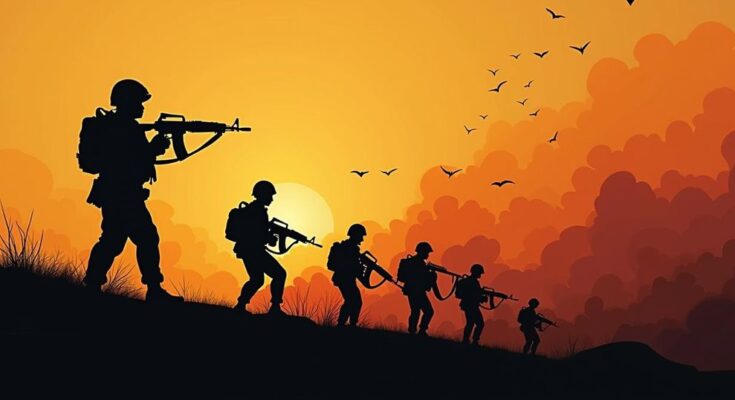Israeli troops are currently engaged in fierce battles with Hezbollah in Lebanon, following a significant missile attack from Iran that reportedly involved at least 180 projectiles directed at Israel. The escalation has raised fears of a broader conflict in the Middle East, prompting military responses from both sides and involving U.S. support for Israel. Heavy civilian casualties have been reported in Gaza amid ongoing Israeli air and ground operations targeting Hamas militants.
Israeli troops are engaged in intense battles against Hezbollah forces in Lebanon amid escalating tensions in the region after Iran launched a barrage of missiles targeting Israel. This incident represents a significant escalation in the long-standing conflict involving Israel, Iran, and various Arab factions. On Tuesday, Iran reportedly fired at least 180 missiles into Israeli territory, prompting widespread alertness among Israeli citizens as air raid sirens blared throughout the nation. The Israeli military confirmed the interception of many of these projectiles, yet several managed to penetrate deeper, causing minor injuries and damage. Israel responded immediately with airstrikes on Hezbollah positions within Lebanon, contributing to pervasive fears of a larger conflict that could envelop the entire Middle East. Simultaneously, ground operations are underway in Gaza, where Israeli forces have been targeting militants associated with Hamas in the wake of a conflict that reignited following the group’s deadly assault on October 7. These operations have tragically resulted in significant civilian casualties, further inflaming tensions between Israel and the Palestinian territories. Prime Minister Benjamin Netanyahu has made a strong statement regarding Iran’s missile attack, asserting that Tehran will face consequences for its actions. The volatility in the region prompted the United States to bolster military support for Israel, highlighting the complexity and potential for broader geopolitical ramifications. Hezbollah has claimed it engaged Israeli forces in clashes near the Lebanese-Israeli border, reflecting the gravity of the situation as both sides prepare for further confrontations. Amidst this backdrop, communities on both sides of the border are grappling with the humanitarian impact of the ongoing violence, and a looming threat of a more extensive war continues to overshadow diplomatic efforts to resolve the crisis.
The recent uptick in violence stems from long-standing tensions between Israel and Iran, alongside regional militant organizations such as Hezbollah and Hamas. Iran’s missile attack on Israel marks a critical point in a years-long conflict characterized by retaliatory strikes and military confrontations. Israeli operations have increasingly targeted Hezbollah in Lebanon due to its support for Hamas during the ongoing war in Gaza, which was reignited after a significant Hamas attack on Israel. This complex web of hostilities is compounded by international interests, as exemplified by U.S. involvement and its military advisory role in the region.
In summary, the situation in the Middle East remains perilous, with the potential for a wider armed conflict heightened by Iran’s missile strikes and Israel’s military responses in both Lebanon and Gaza. The ongoing clashes between Israeli forces and Hezbollah, along with the tragic loss of civilian lives in Gaza, emphasize the dire humanitarian crisis and the urgent need for a concerted international effort to de-escalate tensions. The geopolitical dynamics necessitate close monitoring as developments unfold.
Original Source: apnews.com




